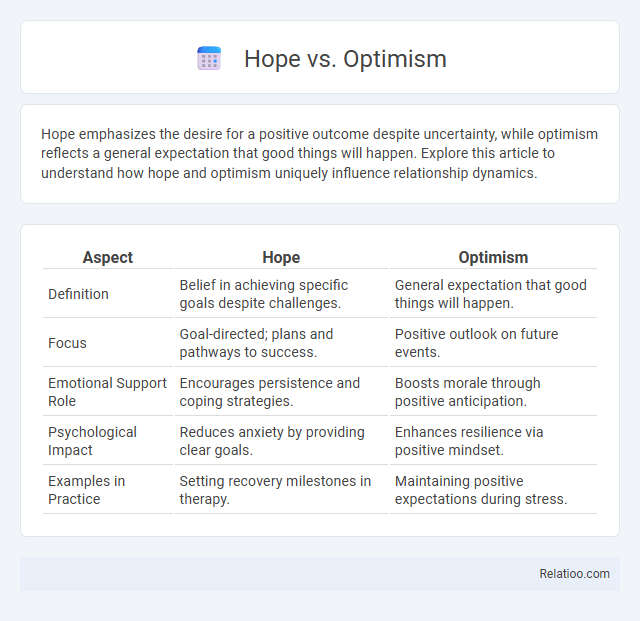Hope emphasizes the desire for a positive outcome despite uncertainty, while optimism reflects a general expectation that good things will happen. Explore this article to understand how hope and optimism uniquely influence relationship dynamics.
Table of Comparison
| Aspect | Hope | Optimism |
|---|---|---|
| Definition | Belief in achieving specific goals despite challenges. | General expectation that good things will happen. |
| Focus | Goal-directed; plans and pathways to success. | Positive outlook on future events. |
| Emotional Support Role | Encourages persistence and coping strategies. | Boosts morale through positive anticipation. |
| Psychological Impact | Reduces anxiety by providing clear goals. | Enhances resilience via positive mindset. |
| Examples in Practice | Setting recovery milestones in therapy. | Maintaining positive expectations during stress. |
Understanding the Concepts: Hope vs Optimism
Hope involves a desire for a specific positive outcome despite uncertainty, while optimism is a broader expectation that good things will happen in general. Understanding the concepts can help you cultivate a balanced mindset by recognizing hope as a focused emotional drive and optimism as a generalized positive outlook. This distinction enhances your ability to navigate challenges with resilience and motivation.
Defining Hope: Meaning and Foundations
Hope is a positive emotional state rooted in the anticipation of desired outcomes despite uncertainty, grounded in cognitive processes that enable goal-setting and motivation. Unlike optimism, which reflects a general expectation that things will improve, hope involves specific agency and pathways thinking, emphasizing both the willpower and strategies to achieve goals. The foundational elements of hope include belief in one's capacity to influence future events and resilience to persist through obstacles, making it a pivotal construct in psychology and well-being research.
What Is Optimism? A Clear Definition
Optimism is a mental attitude characterized by the expectation that positive outcomes will occur even in challenging situations, reflecting a general belief in favorable future events. Unlike hope, which often centers on specific desires with some uncertainty, optimism encompasses a broader, more consistent outlook on life governed by confidence and resilience. Scientific studies link optimism to improved physical health, greater psychological well-being, and enhanced problem-solving abilities.
The Psychological Roots of Hope
The psychological roots of hope lie in cognitive processes that enable individuals to envision positive future outcomes and devise pathways to achieve them. Distinct from optimism, which is a general expectation of favorable events, hope involves goal-directed thinking characterized by agency and planning. This dual-component framework highlights how hope empowers people to overcome adversity by fostering motivation and strategic problem-solving.
The Science Behind Optimism
Optimism is rooted in cognitive science, reflecting a positive expectation about the future based on past experiences and the brain's ability to reframe challenges. Unlike hope, which often involves a desire for specific outcomes without certainty, optimism actively engages neural circuits linked to motivation and resilience, such as the prefrontal cortex and the amygdala. Understanding the science behind optimism can help you cultivate a mindset that promotes mental well-being and effective problem-solving.
Key Differences Between Hope and Optimism
Hope involves a desire for a specific positive outcome despite uncertainty, while optimism reflects a general expectation that good things will happen in the future. Your mindset shapes how you respond to challenges: hope motivates goal-oriented actions based on perceived possibilities, whereas optimism fosters a broad, positive outlook that influences overall attitude. Understanding these key differences helps you cultivate a balanced approach to resilience and motivation.
Benefits of Hope in Challenging Times
Hope provides emotional resilience by fostering a positive outlook during adversity, which enhances coping mechanisms and reduces stress. Unlike optimism, which predicts favorable outcomes, hope combines goal-directed energy and planning to navigate obstacles effectively. This active engagement with challenges promotes mental well-being and sustained motivation in difficult times.
How Optimism Shapes Our Outlook
Optimism shapes our outlook by fostering a positive expectation that favorable outcomes will occur, influencing decision-making and resilience in the face of challenges. Unlike hope, which centers on desire for specific outcomes without guaranteed results, optimism is a broader mindset that enhances mental well-being and motivates proactive behavior. This positive anticipation encourages individuals to pursue goals with confidence, improving overall life satisfaction and stress management.
Cultivating Hope and Optimism in Daily Life
Cultivating hope and optimism in daily life enhances resilience by fostering positive expectations and a proactive mindset toward challenges. Practicing gratitude, visualizing success, and surrounding yourself with supportive individuals amplify your capacity to maintain hope and optimism. These habits create a foundation for mental well-being and empower you to navigate uncertainty with confidence.
Choosing Hope or Optimism: Which Works Best?
Choosing between hope and optimism involves understanding their distinct psychological impacts; hope centers on goal-directed energy and planning pathways, while optimism reflects a general expectation of positive outcomes. Research shows hope is more effective when individuals face significant challenges because it combines motivation with actionable strategies, enhancing resilience and problem-solving. Optimism benefits overall well-being but may lack the structured approach that hope provides in complex or uncertain situations.

Infographic: Hope vs Optimism
 relatioo.com
relatioo.com